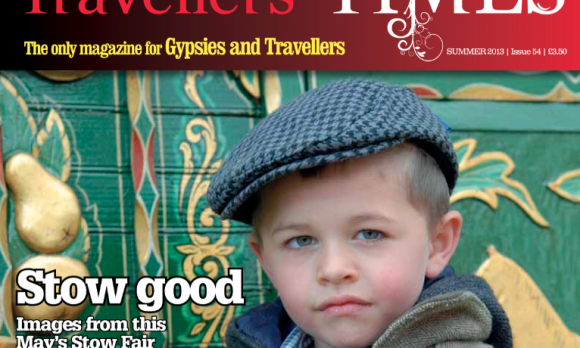Rural Media / Travellers’ Times
By Figen Gunes
Through publishing a magazine, members of the Gypsy, Roma and Traveller (GRT) communities in the UK are equipping themselves with better tools to fight against misconceptions and misrepresentations in mainstream media.
Travellers’ Times magazine, a quarterly publication, is a social enterprise published by the Rural Media Company with an aim of teaching marginalised communities how to be active in producing media content to bring change at local and policy level.
“Members of largely mobile communities are taught how to be good citizen journalists for a start. Then they aim to become proper journalists with great influence in the media,” says Damian Le Bas, editor of the magazine.
High quality media skills and journalism training is provided through their Travelling Voices Programme set up in 2010. Participants learn how to tell their stories, educate people about their culture, and advocate for their very disadvantaged communities with their work published online and in print through Travellers’ Times.
By empowering the GRT community, the founders of the magazine aim to strengthen partnerships with other organisations and become a national umbrella website and information hub. The publication started 14 years ago as a photocopied two-sided piece but developed into a 34 page full colour print media magazine sent out to a wide variety of service deliverers and members of the GRT community such as doctors, HMPs, schools and health care providers and also to every member of the Houses of Parliament.
“We try to make sure there’s something for everyone in our coverage. It’s not easy as we have a readership that goes from the grass roots – Romany Gypsies and Travellers of all ages – through people who work with Travellers, all the way up to politicians. So there’s stuff in there about heritage, old family photos, traditional crafts like wagon building and metalwork, alongside praise for kids who’ve done well at school. Equally important is advice on changes to laws that affect Travellers – these are always changing – and good information about getting proper health care,” highlights Le Bas.
“Reaching policy makers is crucial but not always easy,” he adds. “We challenged ministers and MPs directly on national radio and television: most recently Nadine Dorries MP, who claimed on live TV that Travellers didn’t deserve to live alongside other people in the countryside. So there’s a lot of work to be done. On the positive side, we are part of the Department for Education’s Gypsy, Roma and Traveller Education Stakeholder Group, which is all about raising the attainment of Gypsy and Traveller pupils. It’s chaired by a peer and MPs do attend, so there are ways of getting the message through.”
There is a large wave of migration from countries like Slovakia, Hungary, Bulgaria and Romania into the UK. Estimates show well over one million people from Gypsy, Roma and Traveller communities living across the country. For example; Romani people are the biggest ethnic minority in East Anglia however “racist judgements and backward stereotyping are still in the local media as well as nationals,” adds Le Bas.
He says he found the Big Fat Gypsy Wedding series “outrageous” and “unbelievably insulting” and believes it wouldn’t happen to any other ethnic community but Travellers “are not in a position of power (to resist)”.
The project came to life with the funds awarded by The Big Lottery Fund and since then, The Rural Media Company, who are the charity behind the magazine have been redesigning their offer to attract other funding streams. One of their aims is to direct their print readership to online.
“We have done a comprehensive survey about our readership. In 2010, take up of online content was below national average in these specific communities. In 2012, it was slightly above national average. We believe it’s the positive effects of smart phones and tablets so we are moving towards a digital first policy,” says Nic Millington, CEO of the charity set up 21 years ago.
The Rural Media Company is an award winning charity who’s aim is to strengthen rural communities and challenges disadvantage thorough film, photography, journalism, graphic design and the internet.















Write Your Comment